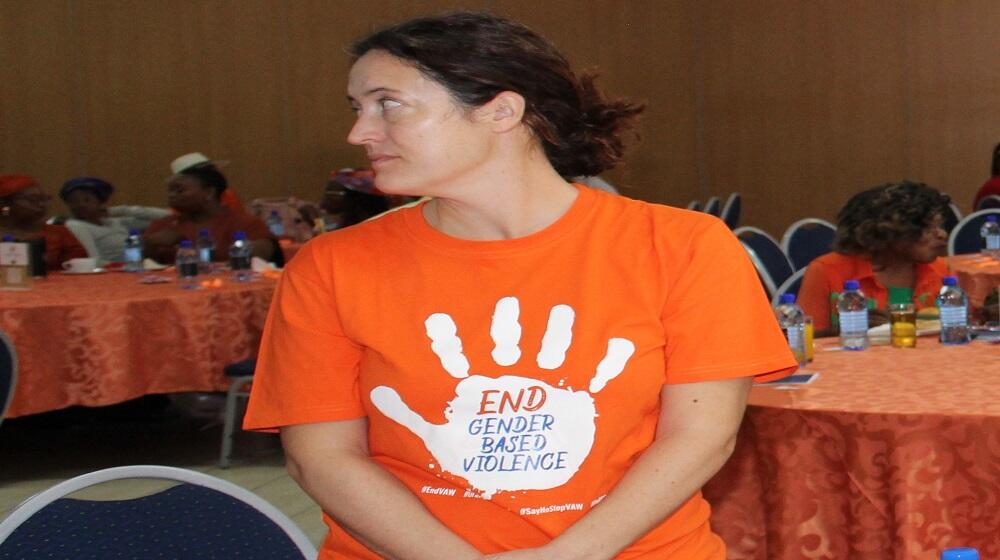People gathered in large numbers for the launch of the 16 Days of Activism Against Gender-Based Violence (GBV) in Lesotho’s capital, Maseru, on 25th November 2024. The event drew a diverse audience, including government ministers, members of the diplomatic corps, civil society organizations, and the media. Featuring insightful presentations and powerful performances, the launch delivered a clear and resounding message: ending GBV demands collective action across all sectors of society.
Among the speakers was the Minister of Education and Training, Professor Ntoi Rapapa, representing the Right Honourable Prime Minister Ntsokoane Matekane. Professor Rapapa described domestic violence as a pervasive and deeply rooted issue that transcends all social and demographic boundaries, profoundly affecting individuals and communities alike. He emphasized that addressing this scourge requires a united and sustained effort at every level of society.
He also praised a survivor who courageously shared her testimony, describing her strength as "true leadership." Professor Rapapa made a recommendation to the Lesotho Mounted Police Service which had made a presentation on GBV data in Lesotho to track what happens to perpetrators of GBV. “That will give us a picture of whether we are addressing the issue or just reporting on it,” he emphasised.
Highlighting the need for practical solutions, he proposed creating a special fund to assist survivors of GBV, suggesting that it be independent of government systems and open to contributions from individuals, entities, and also ministers. Additionally, he called for each government ministry to implement specific programs addressing violence against women and girls in their work environments.
This aligns closely with the sentiment expressed by the Executive Director of UNFPA, the United Nations Sexual and Reproductive Health agency, who emphasized the importance of not only increasing resources but also strengthening laws and policies that safeguard women and girls, particularly in humanitarian settings and beyond.
She highlighted the critical role of engaging men and boys in disrupting cycles of violence and transforming harmful attitudes and gender norms. As she poignantly stated, “On this International Day for the Elimination of Violence against Women, let us renew our commitment to building a world where every woman and girl can live with dignity and equality, free from all forms of violence and harm.”
The Honourable Minister of Gender, Youth, Sports, Arts, Culture, and Social Development, Mr. Pitso Lesaoana underscored Parliament’s commendable progress in passing two critical laws aimed at addressing gender-based violence (GBV). However, he expressed deep concern over the persistent prevalence of GBV, which continues to disproportionately affect women and children.
"Thirty years after Beijing, this monster still lingers. We need robust interventions to confront it head-on. Let us critically evaluate what more needs to be done," he emphasized, calling for intensified efforts and innovative solutions to eliminate GBV in Lesotho.
Speaking on behalf of the United Nations, Resident Coordinator Ms. Amanda Khozi Mukwashi stressed the urgency of uniting against GBV. She pointed out the exacerbation of GBV due to the current humanitarian crisis, advocating for stronger accountability measures for perpetrators and increased education to instil a culture of non-violence from a young age. “We cannot afford to turn a blind eye,” she emphasized, urging both government and individuals to act decisively.
On the other hand, the Assistant Commissioner of Police Tebello T’sepe presented statistics on GBV in Lesotho from January to September 2024, highlighting that 454 cases involving adults were reported, with 266 classified as sexual offenses, including 126 cases of intimate partner violence. Regarding child victims, 364 cases were recorded with 284 being sexual offenses. The Assistant Commissioner also highlighted a concerning trend of more boys falling victim to sexual assaults.
To underscore the far-reaching consequences of GBV, not only on individuals but also on the country’s economy, the Director of Gender, Ms. ‘Matau Futho Letsatsi, delivered a presentation on the economic cost of GBV to Lesotho, revealing the profound financial impact on the nation’s GDP. She highlighted that learning time lost in primary schools due to GBV accounted for an alarming M285.2 million (equivalent to South African Rand), while the cost of law enforcement, which also emerged as one of the largest expenditures, was recorded as amounting to M1.1 million.
During the event, there was also poetry which captured the pain and resilience of survivors, while the survivor's testimony underscored the importance of listening to those directly impacted. These moments served as emotional reminders of the urgency to combat GBV.
The theme for this year’s 16 days campaign is,“Towards 30 years of the Beijing Declaration and Program of Action: UNiTE to End Violence Against Women and Girls”. The campaign also marks the 25th anniversary of the UN’s designation of 25th November as the International Day for the Elimination of Violence Against Women, honouring the memory of the Mirabal sisters, who were assassinated on this day in 1960 for their resistance to oppression.
The gathering underscored the importance of collective action, accountability, and commitment to social change in the ongoing battle against gender-based violence in Lesotho.
Lesotho Unites to End GBV: A Call for Collective Action and Accountability
News
Lesotho Unites to End GBV: A Call for Collective Action and Accountability
01 December 2024


